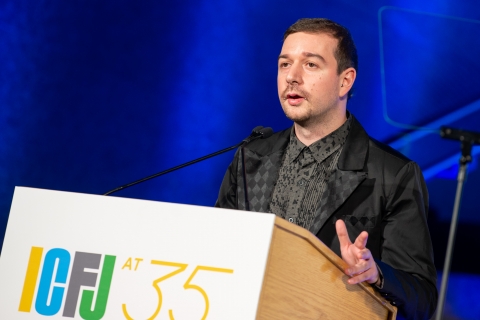ICFJ aired a highlight video describing his and KRIK’s work and the threats they have faced, including his investigation of Serbian Prime Minister Aleksandar Vučić and details about the apparent bugging of KRIK’s offices by security services.
In his acceptance speech (watch here), the editor thanked ICFJ, OCCRP, and KRIK, while also noting that Serbia “is a good case study for understanding how autocrats can take over a democracy.” He warned that it could happen even in the US and listed some of the warning signs. They included undermining of the media, bribery in political parties, subversion of the rule of law, deals between politicians and organized crime groups, legalization of corruption, and the elimination of honest journalists and law enforcement.
Dojčinović called quality journalism “the last defender of democracy” in his country, and noted that KRIK is battling lawsuits and dealing with fake news stories targeting its journalists. He said his organization is made up of “the lucky ones” compared to colleague Khadija Ismailova imprisoned in Azerbaijan on concocted charges, and to Jan Kuciak, a journalist murdered along with his fiance in Slovakia.
Dojčinović closed his speech by calling on media around the world to collaborate more, and to form cross-border alliances (a la OCCRP). He said the media industry must also must get better at fundraising to keep on working.
“Investigative reporting is a public service and we have to pay for it as a public service. This means either by contributions from the people or some national public investigative reporting fund.
“We have to grow a new industry. In our part of the world we need to grow it in a very hostile environment,“ the editor said.

